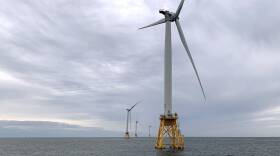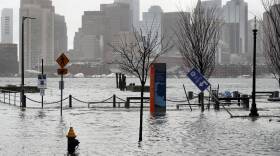-
The challenge of oil companies as NPR sponsors
As climate change stories become more frequent -
Parts of the Northeast and South are recovering after a huge, deadly winter storm
Heavy rains, flooding and destructive winds and tornadoes snarled traffic and knocked out power up and down the East Coast. -
Climate change in Massachusetts impacting fruit crops and sleep quality
The state is experiencing more "tropical nights" -
New state strategy will help coastal towns tackle climate change's "tough questions"
Gov. Maura Healey plans to hire a new chief coastal resilience officer to lead the effort. -
2000 Years of Oceans and Climate
The major ocean currents strongly influence regional climate stability. Today’s rapidly warming oceans will ultimately alter major currents such as the AMOC, with huge consequences for global climate. In order to predict when and where these climate shifts will occur, oceanographers gather data over a long period of time and compare that data with historical variations in ocean temperature and currents. Hali Kilbourne’s focus on 2000 years of the relationship between oceans and climate provides important data for accurate climate models.
In this discussion Dr. Kilbourne describes how scientists collect and analyze the data, and what oceanographers can predict regarding sea level changes, stability of major currents and the coming impact on global climate.Partner:Science for the Public -
Massachusetts climate chief calls for sweeping actions to reduce emissions
Melissa Hoffer recommends limiting the amount of "short hop" flights and decarbonizing new school construction, among other actions. -
In the wake of the hottest summer ever recorded, climate change action heats up in Massachusetts
This summer was the hottest since 1880, according to NASA. But a new wind power partnership and an $11 million grant for Boston's tree canopy is taking root. -
Teen activist urges state lawmakers to act on climate change
Julia Bae has been interested in environmental justice since she first learned about climate change in fifth grade. -
Analyzing Clouds and Climate Change
Clouds are an essential component of the climate. In normal circumstances, they stabilize Earth’s temperature, both by preserving the planet’s heat like a blanket and blocking excess solar radiation. But with prolonged accumulation of atmospheric CO2, the planet overheats, leading to dramatic effects, including massive wildfires –which release particles called “biomass aerosols.” Those particles seed clouds that affect the climate. In this program, Dr. Cziczo explains how these clouds form and why the excess of biomass particles concern climate scientists.Partner:Science for the Public -
Making cities 'spongy' could help fight flooding — by steering the water underground
Almost all of China's medium and large cities are susceptible to floods. Some experts are promoting a solution called sponge cities — urban landscapes that are softer and meant to absorb more water.









